|
|
|
Sort Order |
|
|
|
Items / Page
|
|
|
|
|
|
|
| Srl | Item |
| 1 |
ID:
130443
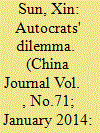

|
|
|
|
|
| Publication |
2014.
|
| Summary/Abstract |
How do authoritarian elections affect voters' attitudes toward the regime and their support for democracy? This article draws upon the case of village elections in China to argue that elections may have two simultaneous effects. First, free and fair elections increase citizens' confidence in the government. Second, elections also allow voters to exercise political rights and accumulate democratic experience through participation, and this in turn may trigger greater demand for further empowerment. Empirical analysis of data from a two-round nationwide survey conducted in 114 villages confirms both effects. One implication of these findings is that competitive elections may simultaneously boost regime popularity and increase public demand for further democratic reform.
|
|
|
|
|
|
|
|
|
|
|
|
|
|
|
|
| 2 |
ID:
124552
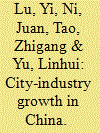

|
|
|
|
|
| Publication |
2013.
|
| Summary/Abstract |
This paper investigates the relevance of two leading theories of city-industry growth (i.e., specialization and diversity theories) in accounting for the fast yet uneven growth of industries in China's cities. Using a comprehensive dataset of manufacturing industries in 231 China's cities for the period 1998-2005, we find that specialization promotes city-industry growth, whereas diversity has no effect at all. In addition, we find that specialization is important for the growth of mature industries in China, but diversity is crucial for the development of China's relatively new and fast-growing industries. Our study contributes to the literature by examining the relevance of the specialization and diversity theories for a large and fast-growing developing economy.
|
|
|
|
|
|
|
|
|
|
|
|
|
|
|
|
| 3 |
ID:
092341
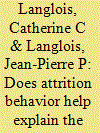

|
|
|
|
|
| Publication |
2009.
|
| Summary/Abstract |
Does attrition behavior, defined as waiting for the other side to give in despite the costs of delay, help explain the duration of interstate wars? To answer this question we develop a war and bargaining model that integrates a dynamic progression of the war and allows the rivals to make offers at any time of their choosing while they fight. The model predicts that, in equilibrium, states choose to fight without making significant offers in the hope that the other side will give in to outstanding demands. The model also predicts that each side's flow cost of war increases with the probability that the other side gives in to its demands. This is the testable consequence of attrition behavior. Our statistical analysis suggests that both challenger and defender include attrition behavior in their conduct of warfare, and that this behavioral element significantly affects the duration of interstate wars.
|
|
|
|
|
|
|
|
|
|
|
|
|
|
|
|
| 4 |
ID:
165299
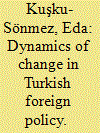

|
|
|
|
|
| Summary/Abstract |
This paper offers a contribution to the literature on Turkish foreign policy (TFP) change through quantitative analysis of Turkey’s foreign policy chronology under the ruling Justice and Development Party (Adalet ve Kalkınma Partisi, AKP) between January 2009 and October 2016. It utilizes an original dataset on foreign policy meetings which is then utilized to ascertain the alterations in their volume, direction and purpose. Through this analytical framework, the paper depicts the course of TFP orientations towards different countries and regions, as well as potential explanations of their dynamics. Among its many findings, the paper suggests that bilateral diplomatic activism in the late AKP period can be explained by motivating factors such as trade, geographical proximity and shared identity. Moreover, fluctuations in regional orientations of TFP can be associated with sudden and less calculated reactions to international or domestic political crisis situations.
|
|
|
|
|
|
|
|
|
|
|
|
|
|
|
|
| 5 |
ID:
192232
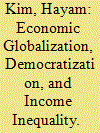

|
|
|
|
|
| Summary/Abstract |
In the last 40 years, East Asian countries have undergone significant economic and political transformation, with deepening integration into the world economy and substantial progress toward democracy. I investigate the impact of these two major developments on income distribution in East Asia. This study extends prior research by (1) examining the role of both international economic and domestic political factors, topics that have mostly been studied separately; (2) employing inequality data that are more complete than those used in previous studies; and (3) using data for a period during which the pace of globalization greatly accelerated, a major relevant event (the Asian financial crisis) occurred, and several countries in the region witnessed a considerable expansion of democratic rights. Evidence for the claim that trade increases inequality is robust, but empirical support for the redistributive effects of both foreign direct investment and democracy is weak.
|
|
|
|
|
|
|
|
|
|
|
|
|
|
|
|
| 6 |
ID:
150715
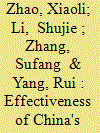

|
|
|
|
|
| Summary/Abstract |
Along with China's rapid industrialization and urbanization, challenges in reducing pollution and CO2 emissions are increasing. One of the major approaches to coordinate economic growth and environmental protection is to substitute coal-fired power with renewable energy. Since 2003, in order to promote wind power development, China has put in place many support policies which fall into either price policy category or non-price policy category. By using a variable intercept and mixed regression model with provincial panel data during 2001–2013, we analyzed the impacts of both categories on the increase of installed capacity in areas with different wind resources. We found that price policy and two non-price policies had positive impacts on the increase of wind power installation, price policy played a greater role than non-price policy did in promoting wind power development, and price policy was more effective in areas with poor wind resources, whilst non- price policy was more effective in areas with rich wind resources. Built on these findings, conclusions and policy recommendations are provided at the end of the paper.
|
|
|
|
|
|
|
|
|
|
|
|
|
|
|
|
| 7 |
ID:
152454
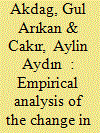

|
|
|
|
|
| Summary/Abstract |
The existing literature on Turkish foreign policy (TFP) asserts that under the rule of the Adalet ve Kalkınma Partisi (AKP), Turkey’s foreign policy shifted from caution and uni-dimensionality to relative activism and multi-dimensionality. This study aims to test these arguments through a systematic analysis of the international agreements ratified by the Turkish Parliament between 1984 and 2015. By looking at the number, content and signatory parties of these international agreements, it aims to empirically show the change in the activism, orientation and instruments of TFP. Using this original data set is not only used to trace the change under the AKP but also across all ruling governments that came to power between 1984 and 2015.
|
|
|
|
|
|
|
|
|
|
|
|
|
|
|
|
| 8 |
ID:
147539
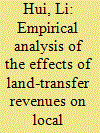

|
|
|
|
|
| Summary/Abstract |
This study examines the use and spending effects of land-transfer revenues in Chinese local governments. It tests the effects of such revenues on local revenue and expenditure structures using city-level budgetary data, and also the effects on the performance of public spending on economic and social development to indirectly estimate the actual spending preferences of local governments in terms of their “total” (both on- and off-budget) spending. The author found that land finance is more of an eastern phenomenon; and most cities in China still rely on budgetary revenues and intergovernmental transfers. Land-transfer revenues tend to be used to support local economic development rather than social development.
|
|
|
|
|
|
|
|
|
|
|
|
|
|
|
|
| 9 |
ID:
157770
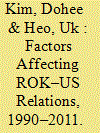

|
|
|
|
|
| Summary/Abstract |
This study investigates what factors affect Republic of Korea (South Korea)–United States (ROK–US) relations based on a theoretical framework, using event data created by content analysis from 1990 to 2011. South Korea’s economic development led to democratization, which resulted in elite changes. New progressive elites interpreted national interests differently and demanded changes in ROK–US relations. Accordingly, the ROK–US relationship was tense during the progressive administrations. ROK’s economic development attracted more trade with the US, which enhanced the bilateral relationship due to heightened interdependence. By contrast, the Democratic People’s Republic of Korea (North Korea)–US relationship and the trade between ROK and China did not significantly affect ROK– relations, meaning ROK’s relationship with other countries does not affect ROK–US relations.
|
|
|
|
|
|
|
|
|
|
|
|
|
|
|
|
| 10 |
ID:
141471
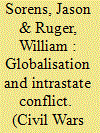

|
|
|
|
|
| Summary/Abstract |
How does globalisation, especially foreign direct investment, influence the risk of intrastate conflict? While several prominent studies have found that globalisation reduces the probability of civil war, we use new data and methods to approach the question. In particular, we test for the possibility that foreign investment is endogenous to conflict risk and appropriately use inward foreign investment stock rather than net inflow to measure an economy's exposure to international capital markets. We find no evidence that foreign investment affects civil conflict, suggesting that governments' fundamental security interests trump the economic losses they can expect to suffer from failing to compromise with potential rebel groups.
|
|
|
|
|
|
|
|
|
|
|
|
|
|
|
|
| 11 |
ID:
185893
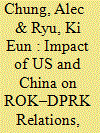

|
|
|
|
|
| Summary/Abstract |
The relationship between the ROK and DPRK is bound to be affected by the two great powers—the US and China. Especially in recent decades, the power gap between the two great powers has continued to narrow. Given this, how is the geopolitical situation surrounding the Korean Peninsula shaping inter-Korean relations? This study uses event data and statistical analysis to explore the geopolitical factors that shaped inter-Korean relations from 1993 to 2019. We find that DPRK–ROK relations deteriorated as the power gap between the US and China narrowed. Also, inter-Korean relations were positive when DPRK–US relations were positive. In short, we conclude that during the shift in the US–China power distribution, maintaining positive DPRK–US relations while also managing inter-Korean relations peacefully is necessary for peace on the Korean Peninsula.
|
|
|
|
|
|
|
|
|
|
|
|
|
|
|
|
| 12 |
ID:
141589
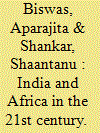

|
|
|
|
|
| Summary/Abstract |
India-Africa relations have evolved dynamically and continuously over the years, having exhibited both change and continuity. During the colonial period, engagement was dictated by the colonial administrators as primary actors. It is only in the post-Colonial phase that formal relations were established between national representative governments. Soon after India’s independence Indo-African interaction focused on the liberation of African countries and only in the post-Cold War era, with the emergence of both India and a large number of African countries as liberal global economies, have relations truly expanded and developed.
|
|
|
|
|
|
|
|
|
|
|
|
|
|
|
|
| 13 |
ID:
147247
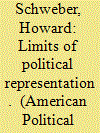

|
|
|
|
|
| Summary/Abstract |
A representation is always a selective and limited reproduction of the thing represented, an idea captured in the metaphor of a map. What is left out of a representation is as important as what is included. A specifically political conception of representation implies limits to the scope of that conception, the nature and character of the represented constituency, and the relationship between constituent and representative, irrespective of variations in institutional design and practice. The limits of political representation reflect normative commitments; consequently, a focus on those limits is central to an evaluation of representative practices. While it is important to look beyond familiar institutional forms, excessively inclusive descriptions of “representative,” “constituency,” or “representation” deprive those conceptions of their substantive content. The limits of political representation are not defects to be overcome by an ever-expanding definition of representation, they are an essential focus in the normative or empirical analysis of representative institutions and practices.
|
|
|
|
|
|
|
|
|
|
|
|
|
|
|
|
| 14 |
ID:
112375


|
|
|
|
|
| Publication |
2012.
|
| Summary/Abstract |
This study argues that a state's power is best conceptualized by considering how a state interacts with all other states in different networks within the international system. This social network explanation for national power is applied to militarized conflicts, one of the most widely studied empirical phenomena in international relations, focusing on their power explanations. The empirical analysis of militarized conflicts at the dyadic level produces findings that strongly support power preponderance theory over balance of power theory. The evidence from nonparametric model discrimination statistics and information criteria measures also shows that our conflict models with new social network power measures have greater explanatory power than or statistically outperform models relying on attributional power measures, such as Correlates of War index and Gross National Product (GNP).
|
|
|
|
|
|
|
|
|
|
|
|
|
|
|
|
| 15 |
ID:
130925
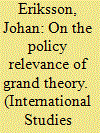

|
|
|
|
|
| Publication |
2014.
|
| Summary/Abstract |
This paper challenges the commonly held perception that grand theory is irrelevant for policy. Policy, it is often argued, is in need of detailed case-oriented empirical analysis and instrumental policy recommendations rather than any sweeping generalizations or lofty ideas emanating from grand theory. Notwithstanding, this paper argues that grand theory has an underestimated relevance for policy. To be able to see and appreciate this, the notion of policy relevance must be expanded. Whereas grand theory and grand concepts such as Realism, Liberalism, Constructivism, or Marxism do not provide case-specific knowledge or recommendations, they provide general roadmaps, conceptualization of world affairs, and also have a symbolic function, legitimating or challenging established policy paradigms. Policymakers, akin to grand theorists, arguably like to make sweeping statements and generalizations. Drawing on theory and findings in public policy studies, here applied to international relations and foreign policy, this paper suggests conditions under which grand theory can be relevant for policy.
|
|
|
|
|
|
|
|
|
|
|
|
|
|
|
|
| 16 |
ID:
131490


|
|
|
|
|
| Publication |
2014.
|
| Summary/Abstract |
Existing accounts posit that defensively oriented counterterrorist policies create negative externalities and result in regulatory competition that induces governments to increasingly tighten their policies. We argue that rather than causing an unconditional global "race to the top," spatial dependence in counterterrorist policies is limited to within groups of countries exposed to a similar level of threat from international terrorism. Countries strongly differ in their propensity to become the target of an international terror attack. Governments can safely ignore counterterrorist policies enacted by countries outside their "peer group," but they must pay attention to measures undertaken by their peers. We test several predictions derived from our theory in an empirical analysis of counterterrorist regulations in twenty Western developed-country democracies over the period 2001 to 2008.
|
|
|
|
|
|
|
|
|
|
|
|
|
|
|
|
| 17 |
ID:
171007


|
|
|
|
|
| Summary/Abstract |
Suicide terrorist attacks are theorized to provide militants with various strategic advantages. Among these is the ability to successfully strike against well-defended or ‘hard’ targets. Scholars argue that because suicide attacks produce higher levels of damage and do not require an escape route for the perpetrator, they are particularly effective against hard targets. Consequently, militants should be expected to use such attacks more frequently, and successfully, against hard targets. This study empirically tests this contention using incident-level data on between 22,000 and 170,000 terrorist attacks in between 154 and 175 countries for the period 1970–2016. It makes two key findings. First, suicide attacks are both more frequently deployed against hard targets, and are more often successfully executed against hard targets. Second, this finding is not a product of foreign military interventions, as previous literature might suggest. Suicide attacks are found to be more likely to be launched against, with success, both domestic and foreign military targets. This underscores the importance of qualities of the target itself when explaining the strategic decision to use suicide attacks by militant groups.
|
|
|
|
|
|
|
|
|
|
|
|
|
|
|
|
| 18 |
ID:
091028
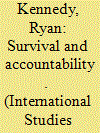

|
|
|
|
|
| Publication |
2009.
|
| Summary/Abstract |
This study re-examines the empirical support for one of the most influential explanations of leadership tenure, "selectorate theory," by testing for consistency across key regime categories. The argument made herein is that if the measures are good, the consistency of their relationships should not be limited to particular nominal regime categories, and they should capture the implications of the theory differentiating it from competing theories. Current measures of selectorate theory concepts are wanting on both fronts. I find that the measure used for winning coalition size is correlated with the destabilization of leaders in democracies and the stabilization of leaders in nondemocracies. I also find that the measure of selectorate size exhibits two behaviors inconsistent with the theory: larger selectorates are only stabilizing after the leader has already been in office for an extended period of time; and the effect is only substantial for differentiating between types of military regimes. These findings have five implications: (1) they cast serious doubt on the utility of current measures of selectorate theory; (2) they raise conceptual questions about the treatment of political regimes as vectors or categories; (3) they define substantive, not just statistical, issues that future measures will need to address; (4) they give baselines for re-analysis of the effect of these measures on other implications of interest; and (5) they provide an interesting comment on the comparative politics literature on hybrid regimes and the effect of parliamentary institutions in nondemocratic regimes.
|
|
|
|
|
|
|
|
|
|
|
|
|
|
|
|
| 19 |
ID:
142434
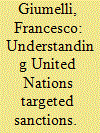

|
|
|
|
|
| Summary/Abstract |
United Nations sanctions have undergone profound transformations in the past two decades. In 1990, the UN Security Council imposed a general, comprehensive embargo on Iraq after its invasion of Kuwait. In 2015, there are 16 Sanctions Committees managing regimes that have little in common with the one imposed against Iraq in 1990. The measures imposed against Iraq were comprehensive, covering all goods coming in and out of the country, while sanctions imposed today are mostly against individuals, non-state entities and are more limited in scope. This article aims to provide empirical and systematic evidence of some of the distinctive qualities of UN targeted sanctions. The analysis identifies three distinctive characteristics of targeted sanctions. First, targeting individuals and non-state actors has permitted the use of sanctions in a wider range of crisis types. Second, the targets of sanctions are substantially different from comprehensive sanctions. Third, the form taken by sanctions is substantially different today from the trade embargoes imposed in the past. The author concludes that the Security Council should devote special attention to the designing and implementation phases of sanctions. The article makes use of the new database prepared by the Targeted Sanctions Consortium (TSC), which includes all cases of UN targeted sanctions.
|
|
|
|
|
|
|
|
|
|
|
|
|
|
|
|
| 20 |
ID:
079060
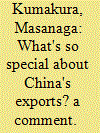

|
|
|
|
|
| Publication |
2007.
|
| Summary/Abstract |
Dani Rodrik argues that China's exports are unusually sophisticated for a country at its income level. He also claims that China's export sophistication reflects the government's successful industrial policy and has been instrumental in the recent acceleration of its economic growth. Although Rodrik's interpretation of China's economic growth is broadly correct, the accuracy of his empirical analysis is questionable. This note identifies several problems regarding the "export sophistication" index used in his empirical work and casts doubt on his analysis.
|
|
|
|
|
|
|
|
|
|
|
|
|
|
|
|
|
|
|
|
|